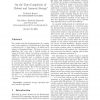Free Online Productivity Tools
i2Speak
i2Symbol
i2OCR
iTex2Img
iWeb2Print
iWeb2Shot
i2Type
iPdf2Split
iPdf2Merge
i2Bopomofo
i2Arabic
i2Style
i2Image
i2PDF
iLatex2Rtf
Sci2ools
130
click to vote
OPODIS
2008
2008
On the Time-Complexity of Robust and Amnesic Storage
We consider wait-free implementations of a regular read/ write register for unauthenticated data using a collection of 3t + k base objects, t of which can be subject to Byzantine failures. We focus on amnesic algorithms that store only a limited number of values in the base objects. In contrast, non-amnesic algorithms store an unbounded number of values, which can eventually lead to problems of space exhaustion. Lower bounds on the time-complexity of read and write operations are currently met only by non-amnesic algorithms. In this paper, we show for the first time that amnesic algorithms can also meet these lower bounds. We do this by giving two amnesic constructions: for k = 1, we show that the lower bound of two communication rounds is also sufficient for every read operation to complete and for k = t + 1 we show that the lower bound of one round is also sufficient for every operation to complete.
Amnesic Algorithms | Base Objects | Distributed And Parallel Computing | Lower Bound | OPODIS 2008 |
| Added | 30 Oct 2010 |
| Updated | 30 Oct 2010 |
| Type | Conference |
| Year | 2008 |
| Where | OPODIS |
| Authors | Dan Dobre, Matthias Majuntke, Neeraj Suri |
Comments (0)

